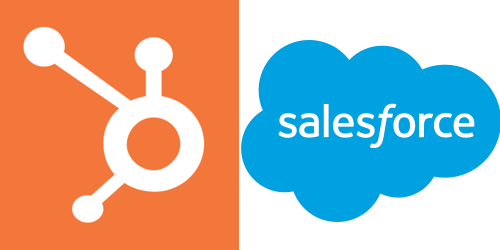Inbound Marketing Blog
for Manufacturers and Healthcare Companies
HubSpot CRM vs. Salesforce: Which Should I Choose?

When you think of CRM software, the first name that comes to mind is Salesforce. They are the 800-pound gorilla in the CRM market.
When you think of marketing automation software, the first name that comes to mind is HubSpot. This company is the pioneer of inbound marketing. However, they are slowly gaining a following for their CRM product as well.
Choosing the best CRM for your sales and marketing is essential to achieve long-term business success. While there are plenty of options to choose from, in this blog, we’ll compare two of the most well-known platforms – HubSpot CRM vs. Salesforce.
Let's take a look at the primary deciding factors for most businesses when comparing these two CRMs.
Price Difference Between HubSpot CRM and Salesforce
The biggest factor in any business decision is typically cost. So, I'll start with the price to save you from immediately scrolling to find it when you land on this post :)
HubSpot CRM
- No trial period, this platform is completely free forever.
- The underlying database for the paid HubSpot Marketing and Sales Tools
Sales Hub upgrades, monthly price:
- Starter: $9 per user (2 users)
- Pro: $90 per user (5 users)
- Enterprise: $120 per user (10 users)
Salesforce
Free trial available for each:
- Lightning Essentials: $25/month/user
- Lightning Pro: $75/month/user
- Lightning Enterprise: $150/month/user
- Lightning Unlimited: $300/month/user
For a full side-by-side comparison of these editions, and to see why Unlimited is sooooo much more than Essentials, check out the Sales Cloud Pricing page.
Base Features of HubSpot CRM and Salesforce
Price is certainly important, but not without understanding the value you get for the investment. Here's a rundown of the base features you get from each CRM.
HubSpot FREE CRM
- 1,000,000 company/contact records
- Companies
- Contacts
- Notes
- Account Owners
- Deals/Opportunities
- Deal Stages
- Sales Process
- Contact Activity Feed
- Email Association/Integration
- Google Apps/G-Suite Integration
- Basic Reporting
- Tasks and Activity Management
Salesforce Lightning Essentials
- Unlimited company/contact records within their storage limits
- Companies
- Contacts
- Notes
- Account Owners
- Deals/Opportunities
- Deal Stages
- Sales Process
- Quotes/Contracts & Quota Management
- Contact Activity Feed
- Email Association/Integration
- Google Apps/G-Suite Integration
- Basic Reporting
- Tasks and Activity Management
HubSpot CRM and Salesforce - Who are they for?
If we focus on comparing HubSpot CRM and Salesforce Lightning Essentials, they will both tell you that they are meant for small businesses. While this is technically true, they tend to be targeted to different levels of sales software users.
Where HubSpot is built to be super intuitive and easy, Salesforce is built with intent to scale into the bigger versions. This makes Salesforce a little more complex than HubSpot.
Put another way, HubSpot is great for first-time CRM users and doesn't pretend to be training wheels for a more complex setup. Salesforce Lightning Essentials is more like a power wheels dirt bike, trying to get you to hop on a full on Harley-Davidson.
We Have Tried Many CRMs and Committed to HubSpot
Now, I know you might be looking for a straightforward answer as to which CRM software will work best for you. While we can’t predict your success, we can share our experience.
Our team is fully committed to HubSpot.
How did we make this decision?
It wasn’t an overnight choice. We have attempted to use several CRMs, including:
- Sugar,
- Zoho,
- Salesforce,
- Insightly, and
- HubSpot.
Why has only HubSpot CRM worked for our team?
It’s easy.
Contacts, companies, deals, and communication are simple, not turned into calculus.
It's intuitive. It's helpful. It's never in the way of itself.
Perhaps most importantly, our manufacturing clients, many of which have never used a CRM, can use this CRM consistently.
New to CRMs? We're Happy to Help!
If you're stuck in spreadsheets, moving deals from one column to the next, it's probably time to get into a CRM.
If you have any questions, we'd be happy to help! We'll be the first to tell you if HubSpot CRM is right for you or if you'd be better off going with another platform.
Our Blogs, Direct to Your Inbox!
How to Audit your Online Marketing
If you are executing digital marketing, congratulations! You are most likely already one step ahead of your competition, and making strides to meaningfully connect with prospects online. But, how do you know if you’re seeing continual success year over year, and improving your metrics?
Without the tools in place to analyze and benchmark your efforts, it is impossible to scale your online marketing and ensure continuous success.


